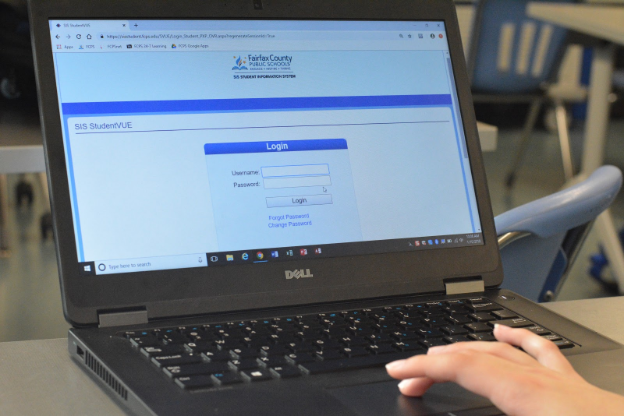Administration sent an email before winter break that raised concern about teachers not recording grades in the Student Information System (SIS) across various classes.
According to the Fairfax County Public Schools website, one of the requirements for teachers is to enter at least nine grades per quarter. But for a period of time after the quarter started on Nov. 7, numerous classes had no assignments in the gradebook.
“Different teachers have different protocols or procedures that they use with regard to how they put grades in,” principal Jeff Litz said. “My expectation is that students are getting regular feedback about how they are doing in their [classes].”
Teachers enter assignments such as homework, classwork, exams and projects into the gradebook on SIS.
“I want teachers to have balance in their lives,” Litz said. “It’s really up to each teacher to fulfill [the] professional responsibility of entering grades. When and how they do that […] is going to vary.”
English teacher Kelsey Breslin said the delay in recording grades was due to increased rigor of the material students learn, and their progress after the first quarter.
“As the year goes on, we’re asking our students to do more challenging things so […] being able to assess them and giving them really valuable feedback […] takes longer because [they’re] getting better,” Breslin said. “We need to give [them] more specific feedback because [their] knowledge is increasing.”
Litz said teachers have more responsibilities during the time semester grades come out.
“Teachers work very hard […] and a lot of them go the extra mile to make sure that students have worthwhile assessments,” Litz said. “They take their time to make sure they are giving kids quality feedback on their work.”
Senior Katie Curry said delayed grades affect seniors the most, who need to send their first semester report cards to colleges, and may not have enough time to remediate late-graded assessments.
“For seniors, first semester grades matter more because they get sent to colleges,” Curry said. “Not knowing where you stand is frightening because if your grade ends up lower than you thought [it would be], it might be too late to fix it.”
Despite the importance first semester grades carry for seniors, Curry said she thinks students should be more considerate of teachers’ personal lives, and not pressure them to grade assignments.
“Teachers have personal lives like everyone, [so] we, as students, should take that into consideration,” Curry said. “We have a tendency to hold teachers to high standards because we [often] forget they’re just people too.”
Teachers receive two periods off, one of which they spend meeting with their curriculum teams at least once a week to plan lessons and create common assessments. They also have teacher workdays at the end of each quarter.
“I spend a lot of my teacher workdays preparing for the entire quarter so that I can focus my time in the quarter […] grading and giving feedback,” Breslin said. “I love that we have teams so that we can rely on each other for creating assessments. Just having a big Marshall family, especially in the English department, really helps my sanity.”
Litz said he values the feedback teachers give students more than the grading itself.
“There are multiple ways you can give kids feedback,” Litz said. “One [of them] is through a grade. If [students] are getting meaningful feedback about their mastery of content along the way that, to me, is more important than an actual grade.”
2019-01-23

